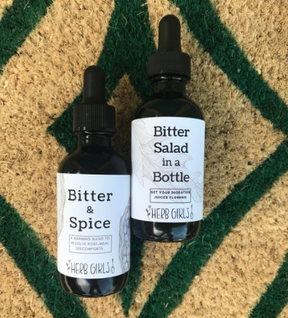|
Is Stomach Acid!!!!  I’m going to keep this brief (kinda) because I want everyone to read it. We live in a world of information overload. You can Google anything and get 500 different answers. Everyone has an opinion, and this is great; however, it is also dizzying. Here’s my opinion: trust your gut. But how can you trust your gut if it’s a hot mess? No one should live with acid reflux. It is PREDOMINATELY preventable. If you are reading this, you likely have the luxuries of sleeping indoors and access to ample resources. At this point in our evolution as civilized beings, we have access to all the tools we need to thrive, and yet many people are living with consistent stomach pain. This should not be the case. A healthy gut operates by means of: a well-nourished mucosal lining, strong stomach acids (pH=1-3), and digestive enzymes. All these components are connected. Unlike the rest of the body, the stomach needs to be very acidic so it can pulverize the things we eat. What’s more, enzymes can only be activated in an acidic state. Stomach acid and unlocked enzymes cause digestion. Insufficient stomach acid and dormant enzymes cause indigestion. Over time, undigested food can irritate and inflame the mucosal lining, perhaps wearing it down and eventually escaping into other parts of the body (i.e. leaky gut). It’s amazing that our bodies create hydrochloric acid (HCl), a main ingredient of stomach juice. It can eat through metal! Stomach acid not only unlocks enzymes, but it also keeps bad bacteria out. As we age, we loose the ability to create powerful stomach acids. When we eat an excess of certain foods, we loose the ability to create powerful stomach acids. When we rush our meals and don’t take time to chew properly, we aren’t allowing our body to kick into digestive mode to secrete stomach acids. When we don’t eat bitter foods before meals, an evolutionary cue to promote gut secretions, the body is less primed to digest fully. When we don’t have sufficient stomach acids, the LES (lower esophageal sphincter the separates esophagus from stomach) is never cued to close. Acid doesn’t belong in the esophagus, and hence heartburn is felt. Gas, bloating, indigestion, heartburn- there are many causes of digestive pains, but the key ingredient to solving all these issues is acid! Conventional protocols for acid reflux can be over-the-counter acid neutralizers (antacids), or prescribed acid blockers (histamine H2-receptor blockers and proton pump inhibitors). Acid neutralizers “work” by balancing an acid with an alkali (calcium, sodium, aluminum, or magnesium). They don’t interfere with the process of your stomach secreting acid; rather, the alkali salt combines with your HCl to neutralize it. Antacids are transient, working only until all the antacid molecules are used. For occasional use, they can be helpful. If taken consistently, they can seriously mess with the functionality of your gut. First off, your food can’t be digested in such a neutral state, so you are robbed of vital nutrients and minerals. They can cause elevated blood pH, excess calcium in the blood, and kidney failure; this is called milk-alkali syndrome. Some women are led to believe that antacids in the form of calcium-carbonate can do double duty as a calcium supplement for osteoporosis prevention. This is a terrible misconception; in fact, calcium can only be absorbed and properly deposited in an acidic environment. Histamine H2-receptor blockers “work” by chemically inhibiting the process of stomach acid secretion. The hormone gastrin stimulates histamine-producing cells that stimulate stomach acid secretion (the body is complex!). With the histamine signal blocked, stomach acid is not secreted. No stomach acid secretions means no enzymes unlocked, no vital nutrients and minerals absorbed. Additionally, messing with hormone signaling causes adverse side effects with our sex hormones (not something to be tampered with). Proton pump inhibitors “work” by tinkering with the cells that line the stomach. Their “proton pump” mechanism is responsible for secreting HCl. These pills are effective: they can reduce acid secretions by up to 95%. Once again, with deficient stomach acid, your food simply isn’t digested. Over time, this creates uncountable issues. Our bodies are designed to produce acid to digest food. Let’s cut to the chase and just promote this natural process rather than interfering with it. What you can do: Stop diminishing your stomach acid and start building up that nutrient-unleashing digestive power! There are ample natural remedies to restore gut health to its full vitality. This method is FREE and universal:
These methods are affordable and versatile. Find the combination that works for your unique situation: 1. Take bitters. The bitter reflex stimulates the digestive process to kick into action. This taste is largely lacking from the modern diet, and partially explains our rampant gut issues. Bitters come easily in the form of tincture, but even just having a bitter green salad before the heft of your meal (this is traditionally why salads proceed your main meal). The bitter stimulus triggers a positive waterfall of chain reactions whose effects reach far beyond healing your gut. Guido Mase’s Urban Moonshine and David Winston’s Herbalist & Alchemist both carry great bitter selections... as do the Herb Girls! I can’t stress the importance of bitters enough! (( Plant insight: Wormwood, Artemisia absinthium, Dandelion Root (Taraxacum officinale), and Artichoke leaf (Cynara scolymus), and Fenugreek (Trigonella foenum-graecum) are some classic and powerful bitters. Gentian (Gentiana lutea) is another classic bitter but I shy away from recommending it as it is in danger of being overharvested.)) 2. Pop a DGL. Deglycyrrhizinated licorice (DGL) maintains all of licorice’s healing properties without its effect on blood-pressure. Licorice’s demulcent, soothing nature restores the mucosal lining of the stomach, reducing pain and inflammation. It is also strengthening to the immune and endocrine system and trophorestorative to the liver. These tasty, sweet, melt-in-your-mouth tablets can be taken as needed throughout the day. Substitute your antacids with DGL. They will bring the same relief with positive side-effects rather than negative ones. Planetary Herbs has a great DGL product. (( Plant insight: The legume Glycyrrhiza glabra is a staple in traditional herbal medicine. This starchy root has a profound capacity to nourish the adrenals, often an underlying issue in many chronic stress relating disorders. It also nourishes and heals respiratory function and all sorts of gastrointestinal issues. )) 3. Get on the Manuka honey train. Manuka honey is made from the blossoms of the Tea tree (Melaleuca alterniflora). Manuka honey is wildly delicious, antibacterial, and soothing to the entire respiratory and GI tract. Like licorice, it restores the mucus membrane and reduces pain and inflammation. ManukaGuard makes a product, Nutralize, that combines Manuka honey with raw apple cider vinegar. Taken before meals, this both heals the gut and stimulates digestive juices. 4. Consider Digestive Enzymes. You simply can’t break down food and absorb nutrients and minerals without sufficient enzymes. Gas, bloating, and mineral and vitamin deficiencies will be your fate without these crucial elements. Arthur Andrew Medical Divegest offers a potent yet gentle blend. It contains peptidase which breaks down gluten and casein, two common food irritants. Over time, if you work up your stomach acids and find the foods that your body was built to digest, you might not have to rely on these. 5. Protect your gut. I can’t stress enough the importance of an intact and un-inflammed gut lining. This mucus membrane is your first line of protection from corrosive stomach acid and unwanted bacterial visitors. If this becomes eroded, all that good stomach acid can cause pain and bacteria can proliferate. Additionally, bad bacteria proliferate when the acidic pH raises to an alkaline state- herein lies the connection between long-term use of acid-inhibiting pills and stomach ulcers. LifeExtension’s CarnoSoothe both rebuilds the mucus membrane and provides protection from H. pylori bacteria, the cause of many stomach issues. The star plant Picrorhiza kurroa is a Himalayan herb used traditionally for rebuilding and protecting the stomach lining. (( Plant insight: Herbs categorized as demulcents are critical for folks recovering from gut disorders. Demulcent herbs are soothing and nourishing to the mucus membranes of our entire GI tract, and facilitate smooth elimination. They include Marshmallow, Althea officinalis, Plantain (Plantago major), Licorice, and Slippery Elm (Ulmus fulva). However, Slippery Elm is in danger of being overharvested, so vie for the more renewable sources. )) DISCLAIMER: This is all educational material and from personal experience. In more serious cases of severe reflux and/or esophageal damage, definitely consult with a physician before withdrawing from acid blockers or antacids. Be patient! Positive change wills come- it will just take a bit more effort. You can do it! Resources: Why Stomach Acid is Good for You, Jonathon V. Wright, MD & Lane Lenard, PhD Comments are closed.
|
Eileen Brantley & Amy WrightWe are Herb Girls Athens, LLC. Read our blog! Archives
November 2022
Categories
All
|

 RSS Feed
RSS Feed
